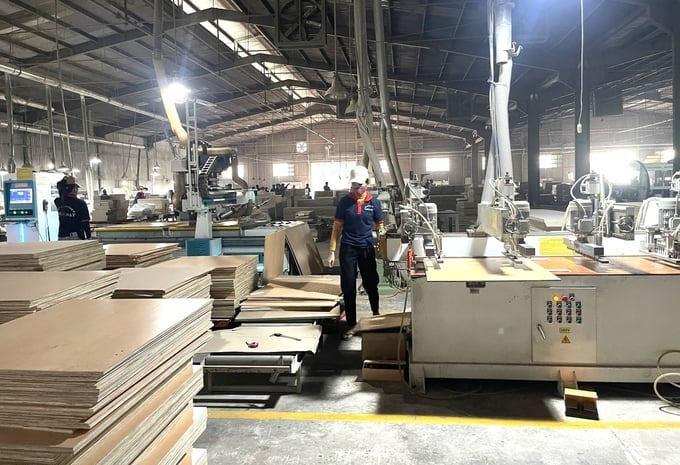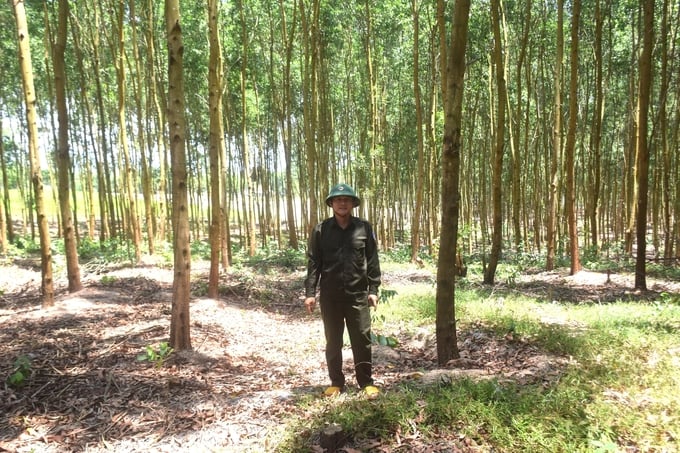June 15, 2025 | 11:30 GMT +7
June 15, 2025 | 11:30 GMT +7
Hotline: 0913.378.918
June 15, 2025 | 11:30 GMT +7
Hotline: 0913.378.918
According to Bui Tan Thanh, Deputy Director of Binh Dinh province's Department of Agriculture and Rural Development, the European Union (EU) issued the EU Deforestation Regulation (EUDR) in mid-2023 to prevent illegal wood and wood products linked to deforestation activities from entering the European market.
According to the schedule, the regulation will enter into effect at the end of 2024. Consequently, numerous agricultural products from Vietnam, including wood exports to the EU market, will be refused entry unless export businesses can authenticate the transparent sourcing of raw wood materials.

Binh Dinh province is currently home to 354 businesses specializing in the production and trade of wood exports to the European market. Photo: V.D.T.
Le Minh Thien, Chairman of the Binh Dinh Wood and Forest Products Association, added that the primary requirement for wood exports to the European market is the traceability of raw wood materials, as indicated by their geographical location and site of harvest. Accordingly, raw wood materials must be acquired from forests certified for sustainable management (FSC); additionally, they cannot be associated with deforestation or forest degradation.
"Raw wood materials obtained from areas measuring under 4 hectares in size require pinpoint traceability, whereas materials obtained from areas measuring over 4 hectares require regional traceability. The assessment will take place before the business places an order or before the shipment is exported. The exporting business must send relevant post-assessment information to competent authorities in the EU," explained Le Minh Thien.
According to Le Minh Thien, the EUDR significantly impacts Binh Dinh's wood industry as the province is currently home to 354 businesses specializing in the production and trade of wood exports to the European market.
If businesses from the wood industry in Binh Dinh comply with the EUDR, this set of regulations will enhance the company's competitiveness in the European market; and the volume of wood products entering this market will increase. Conversely, if they fail to comply, their products will face barriers to entry into the European market, which will gradually remove the company from the global supply chain, resulting in substantial losses.
Numerous European partners have requested that starting from December 30, 2024, businesses from the wood industry in Binh Dinh must provide detailed product documentation, including a supply chain map, and geographical positioning in the form of polygon maps or GPS coordinates of the wood harvesting sites. Moreover, they have requested Vietnamese businesses to ensure that the wood harvesting sites are not subject to deforestation and forest degradation.
"A significant portion of the planted forest areas in Binh Dinh province lacks FSC certification; and many forest land areas do not possess full legal status, thereby presenting challenges in tracing the origin of raw wood materials," Le Minh Thien noted.

Binh Dinh province must focus on the long-term, sustainable development of its forests to maintain a transparent origin for raw wood materials. Photo: V.D.T.
The EUDR poses an even greater challenge for pellet and wood chip products. The raw materials for these products are obtained from small-scale planted forests beloning to multiple farmers, which pose as a considerable obstacle for producers in providing detailed information regarding the origin and geographical coordinates of the harvested forests.
"Binh Dinh province needs to turn this challenge into an opportunity with a focus on long term development. Namely, the development of sustainable forests with transparently sourced raw wood materials is crucial to gaining access to the European market," shared Nguyen Thanh Phong, General Director of Phu Tai Bioenergy Joint Stock Company in Binh Dinh province.
"Binh Dinh province boasts over 167,600 hectares of planted forest areas, including nearly 77,600 hectares of land leased by the government for afforestation activities. The remaining areas do not possess either full legal status or detailed geographical coordinate data," commented Bui Tan Thanh, Deputy Director of Binh Dinh province's Department of Agriculture and Rural Development.
The European Union Deforestation Regulation (EUDR) includes three key points: products must not be produced from materials causing deforestation or forest degradation after December 31, 2020; the production process must comply with the laws of the country of origin; geolocation information for harvesting sites are mandatory; and a due diligence system must be enforced to authenticate compliance with the laws of the country of origin.
On the other hand, the National Forest Certification System was established by the Ministry of Agriculture and Rural Development in 2019 based on the Prime Minister’s Decision No. 1288/QD-TTg in 2018. Accordingly, the production process is subject to two primary groups of standards: the Sustainable Forest Management Standard (VFCS/PEFC) and the Product Chain of Custody Standard (PEFC CoC).
Translated by Nguyen Hai Long
![Turning wind and rain into action: [4] Bringing climate bulletins to remote and isolated areas](https://t.ex-cdn.com/nongnghiepmoitruong.vn/608w/files/linhnhp/2025/06/14/1152-z6704423696987_15fd32ffc26d590d204d520c9dac6786-nongnghiep-151141.jpg)
(VAN) The Vietnam Agriculture and Nature Newspaper interviewed Mr. Vu Thai Truong, Acting Head of Climate Change and Environment at UNDP Vietnam, to gain deeper insight into how climate bulletins are delivered to farmers.

(VAN) In Tien Giang, a high-tech shrimp farm has developed a distinctive energy-saving farming model that has yielded promising results.
![Turning wind and rain into action: [3] 300.000 farmers benefit from agro-climatic bulletins](https://t.ex-cdn.com/nongnghiepmoitruong.vn/608w/files/news/2025/06/12/e5a48259d6a262fc3bb3-nongnghiep-125122.jpg)
(VAN) The agro-climatic bulletin has become a valuable tool for farmers in the Mekong Delta. After more than five years of implementation, the initiative is gradually being expanded nationwide.
![Turning wind and rain into action: [2] Providing forecasts to the people](https://t.ex-cdn.com/nongnghiepmoitruong.vn/608w/files/news/2025/06/12/e5a48259d6a262fc3bb3-nongnghiep-103927.jpg)
(VAN) In addition to improving the quality of hydrometeorological forecasts, putting forecast bulletins into practical use is crucial for production and disaster prevention.

(VAN) Blue carbon is receiving attention for its rapid absorption capacity and vast potential. It represents a promising nature-based solution to respond to climate change.
/2025/06/11/3507-1-161904_583.jpg)
(VAN) Seagrass beds and coral reefs serve as 'cradles' that nurture life in the ocean depths, creating rich aquatic resources in Vietnamese waters.
![Turning wind and rain into action: [1] Forecasting for farmers](https://t.ex-cdn.com/nongnghiepmoitruong.vn/608w/files/news/2025/06/11/e5a48259d6a262fc3bb3-nongnghiep-111919.jpg)
(VAN) Weather is no longer just a matter of fate. Forecasts have now become an essential companion for farmers in every crop season.